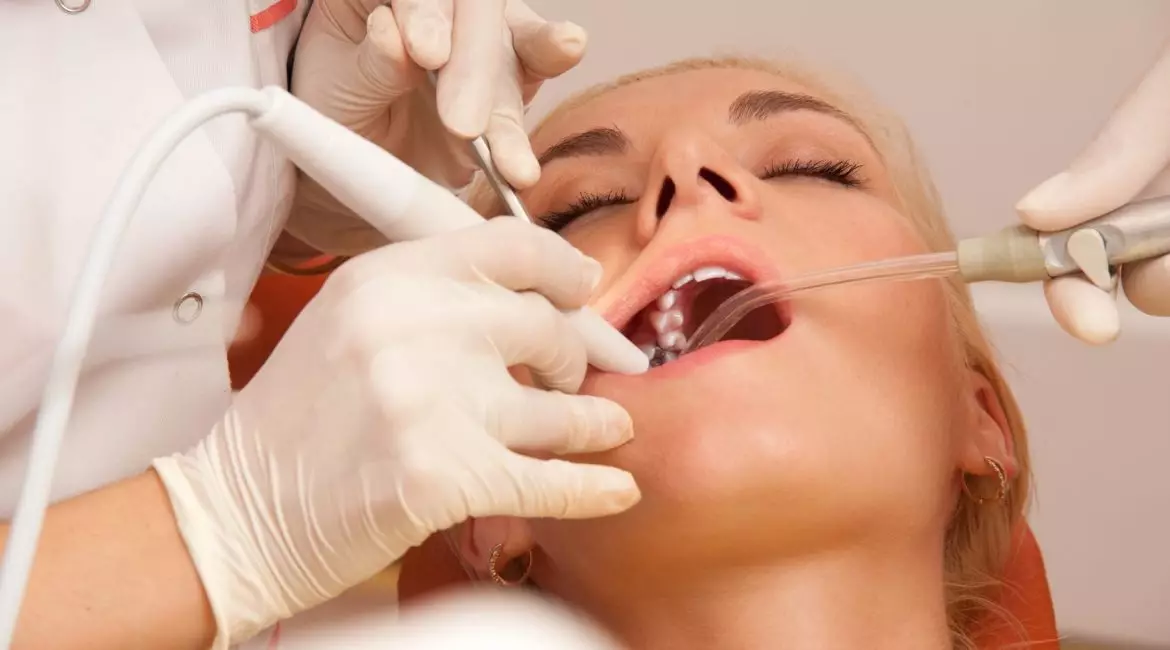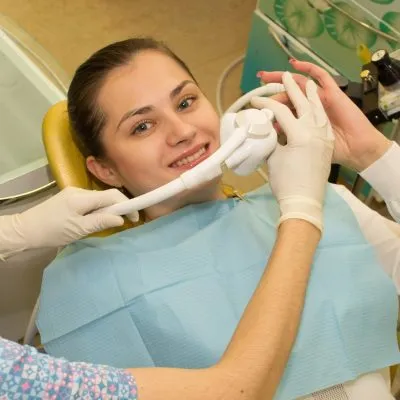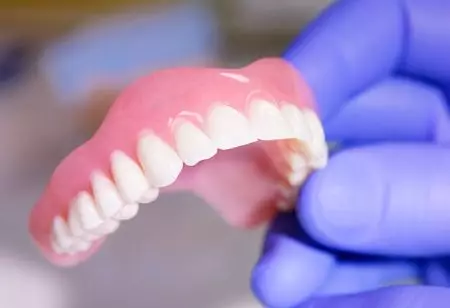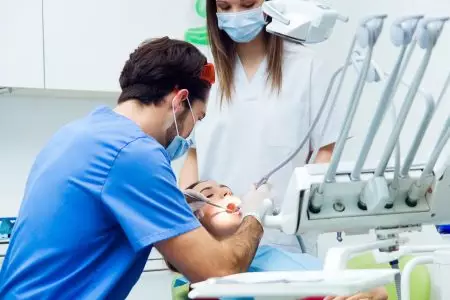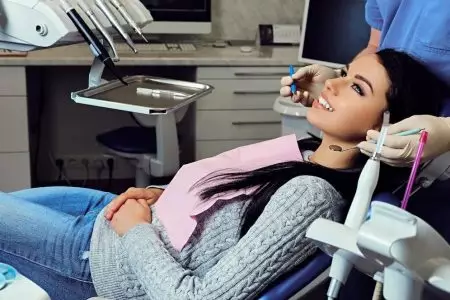- Dental treatment under sedation is the best way to get rid of fear
- Dental treatment under sedation
- How sedation differs from anaesthesia
- Indications for sedation
- Contraindications to the procedure
- Types of sedation
- Advantages of contacting the Dent-House Family Dentistry Clinic
- How much does it cost for dental treatment under sedation in Odessa?
- Frequently asked questions about sedation
- Specialists
- Make an appointment
Sedation
medicated sleep
Sedation
a state of the body characterised by the absence or reduction of consciousness, suppression of reflexes and pain sensitivity, artificially achieved by the administration of sedative drugs.
Sedation makes the sensations of unpleasant odours, sounds and manipulations neutral and after the appointment, memories of them are blurred or absent. Another important advantage of sedation over anaesthesia is that it helps dentophobic patients to gradually let go of their fears. How does this happen? The patient undergoes dental treatment under sedation and gradually, from appointment to appointment, moves to increasingly superficial levels of sedation (concentration) until it is clear that sedation is no longer necessary.
Sedation is not anaesthesia or anaesthesia. It is a general state of relaxation in which quality treatment can be carried out. Unlike anaesthesia, during sedation the patient is conscious and communicates with the doctor, and all reflexes are preserved.
It is often recommended that the first treatment of children be carried out under sedation. A new environment, new smells, sounds, instruments, the need to sit down and keep the mouth open – all this may be too uncomfortable for the child. Sedation helps to reinforce the child’s positive image of the dental appointment.
- If there is a mild fear of treatment. Sedation can help ease the tension.
- If there is a complicated treatment to be done, removal.
- If there is to be long-term treatment.
- If there’s an increased gag reflex.
- No nasal breathing.
- Chronic diseases in the acute stage, general acute diseases.
- Age up to 3.5-4 years. Children, as a rule, are not ready to cooperate with the doctor. In this case, we recommend treatment “in a dream”.
- Too much fear of the dentist and a categorical unwillingness to contact the doctor (for example, after an unsuccessful treatment experience). In this case, treatment “in a dream” is also recommended.
- Overfull stomach.
- Alcohol, drug addiction.
- Traumatic brain injury.
- If you are constantly taking any medications, be sure to discuss this with your doctor during a preliminary consultation.
- Superficial sedation preserves the patient’s reactions and basic reflexes. Once in a calm state, the patient is able to fulfil simple requests from the doctor and answer his questions.
- Deep sedation involves putting the patient into a sleep in which he or she does not respond to external stimuli.
- Preliminarily
- Prior consultation with an anaesthesiologist on contraindications is necessary.
- Inhalation. The sedative is administered through an inhalation mask. Before visiting the doctor, the patient should refrain from eating. It is not recommended to drink alcohol or drive for 24 hours after the treatment. This method of sedation is recommended for children as the safest.
- Oral. If the patient suffers from dental phobia and needs preliminary sedation before starting treatment, some Valium-based drugs may be prescribed the night before visiting the dentist.
- Injection. The doctor injects the patient with a tranquilizer intravenously. You must refrain from eating two hours before the procedure. Recovery after treatment takes one hour.
Preliminarily
Prior consultation with an anaesthesiologist on contraindications is necessary.
Before dental treatment, the patient should have a general blood test, an ECG and an HIV test.
Course of the procedure

Medications with sedative effect are administered to the patient.

After a couple of minutes, the dentist injects the patient with anaesthesia.

The doctor performs dental treatment

The patient is brought out of a tranquil state
Dental treatment under sedation is the best way to get rid of fear
Dental treatment under sedation is a manipulation that is carried out in a special state of the patient. The person is completely relaxed, but remains conscious and can fulfil the doctor’s requests during treatment. This is the best way for people who are afraid of dentists and postpone visiting the doctor in every possible way, even when there are serious problems with their teeth, as well as for children. Let’s find out what treatment under sedation is and dispel the myths associated with this topic.
Dental treatment under sedation
What is sedation? It is a state in which the patient is as relaxed as possible and reflexes and pain sensations are suppressed. This effect is achieved with the help of special medicines.
During sedation, the patient does not react to unpleasant sounds, odours and manipulations, and after treatment, memories are absent or blurred. By gradually reducing the level of drug concentration, the patient can be relieved of dentophobia.
Sedation has several advantages:
- the doctor can perform a large number of jobs at one time;
- decreases saliva secretion, which contributes to fast and effective treatment;
- few contraindications;
- the patient is relaxed, thus creating a positive attitude towards the dentist.
- Also, sedation is as affordable as possible.
How sedation differs from anaesthesia
Many people confuse sedation and anaesthesia, but they are different. Anaesthesia is a state of deep sleep in which there are no reflexes or pain sensations. The patient is unconscious and the anaesthetist needs to constantly monitor the person’s condition, breathing and heart rate. With sedation, the patient is in a relaxed state and can talk to the doctor and fulfil his requests. Sedation is much easier on the body – the patient is easily brought out of the relaxed state. There are no side effects. However, local anaesthesia is still required during sedation.
Indications for sedation
There are several reasons why a dentist may advise treatment under sedation:
- Dentophobia. This is far from a harmless disease – severe anxiety, dizziness, panic attacks not only affect the patient, but also prevent the doctor from carrying out treatment.
- Increased gag reflex.
- A wide range of dental work – tooth extraction, preparation for implants or crowns.
- Allergy to pain medication.
- Presence of heart disease.
Sedation treatment is also recommended for children of any age who have a panic fear of dentists or cannot sit still for long. We also offer this method to hyperactive or overly sensitive babies, babies who have serious health or developmental problems.
Contraindications to the procedure
Treatment under sedation should not be performed if:
- of pregnancy;
- epilepsy;
- cardiovascular disease;
- mental disorders;
- head injuries;
- chronic diseases in the stage of exacerbation;
- respiratory system disorders.
Sedation should be postponed if you have a cold or respiratory tract infection. Sedation should not be carried out on a full stomach or under the influence of drugs or alcohol.
Types of sedation
There are 2 types of sedation – superficial and deep. In the first case, the patient is conscious, and in the second case, the patient falls into a medically induced sleep. The type of procedure is determined by the doctor. The price also depends on the type of sedation and the amount of drugs.
Depending on the method of drug delivery, the following types are distinguished:
- Oral. In this method, the patient takes Valium-based medication the day before treatment.
- Inhalation. In this case, the sedative is given using an inhalation mask. This is the best way to give medicines to children.
- Injectable. The doctor injects the patient with a tranquilliser intravenously.
Inhalation and injection anaesthesia should not be performed on a full stomach. It is also not recommended to drive on this day.
Advantages of contacting the Dent-House Family Dentistry Clinic
Where to perform treatment under sedation in Odessa? Of course, in the clinic of family dentistry “Dent-House”. We are chosen because we offer:
- A wide range of professional services. In our clinic you can treat tooth decay, implantation, whitening, braces and veneers, as well as other problems.
- Professional doctors. These are certified specialists with extensive experience who are constantly upgrading their qualifications.
- Professional equipment. We use only innovative technologies and certified equipment in our work.
- Family-centred approach. At our clinic, we will plan and treat all members of your family at the same time, making the most of your time at Dent-Haus.
- Sterility. We carefully monitor the health and safety of our patients. We use the latest equipment for sterilising instruments and regularly disinfect the clinic.
- Loyalty programme. We offer patients all types of available materials, which allows us to adjust the final cost of treatment. We also have a system of seasonal promotions.
- Interior. “Dent-House” in Odessa is a freestanding building with a cosy and modern interior. Each dental office is decorated thematically. Also at your service is a foyer, a separate patio, a recreation area.
Make an appointment now!
How much does it cost for dental treatment under sedation in Odessa?
How much does sedation treatment cost: The cost of the procedure in our Dent-House clinic depends on the duration of each individual case. You can check the prices on the website or with the receptionist by phone. On our web portal you can read useful information, reviews of our work and meet the doctors in absentia.
You can make an appointment by calling (048) 775 66 55, (050) 564 07 50 and (048) 7 705 165 or using the online form on the website. Our dentists are waiting for you!
Frequently asked questions about sedation
🦷 Is sedation dangerous during dental treatment?
😁 What should not be done after sedation?
🦷 How many teeth can be treated at once under sedation?
😁 How long does sedation last?
Cost of services
-
Sedation 1 hour 5000 UAH
Specialists

Ekaterina Sergeevna Furduy
Paediatric dentist


